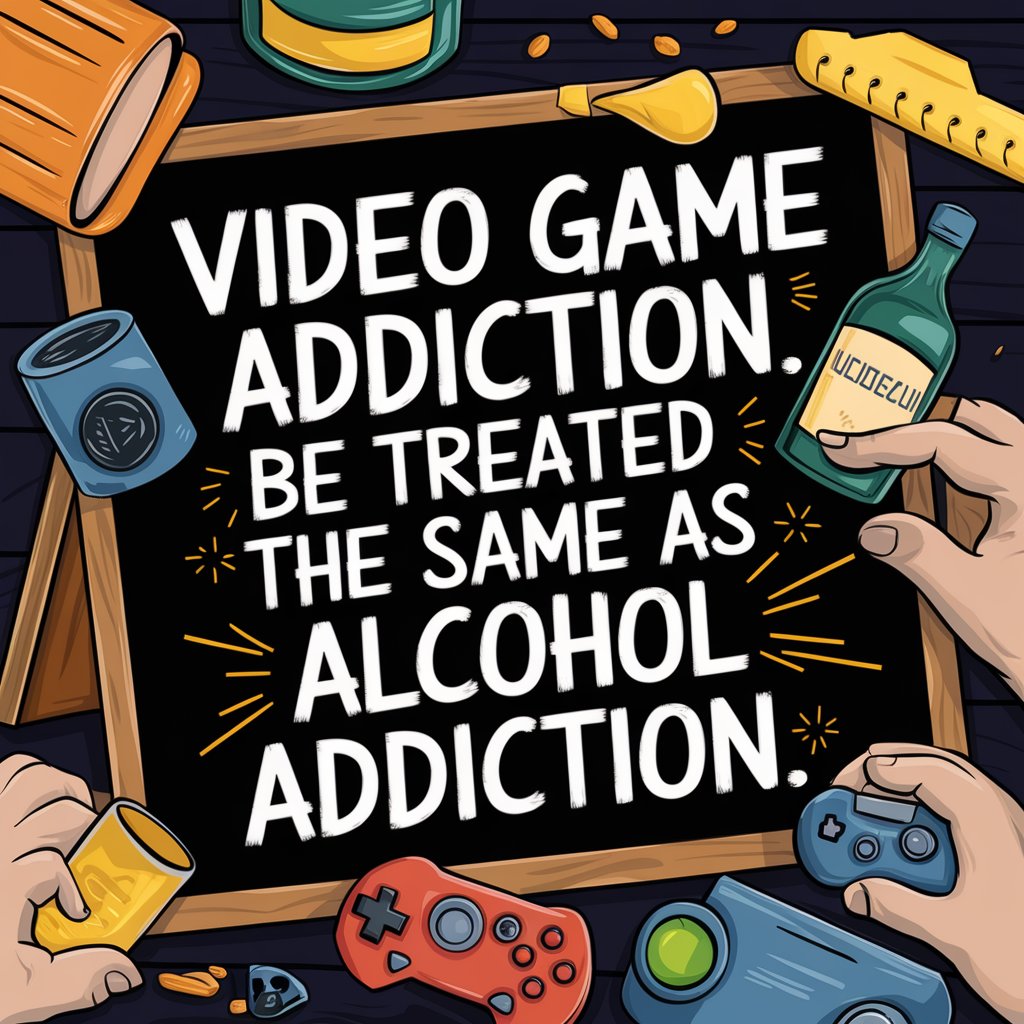Video games have become a significant part of modern culture, offering entertainment and social interaction. Yet, as gaming prevalence rises, so does concern over gaming addiction. Research indicates that video game addiction can be treated using similar methods as alcohol addiction, including therapy and support groups.
Many experts recognize that both conditions share similar psychological patterns, including cravings and withdrawal symptoms. Treatment approaches, such as cognitive-behavioral therapy, can help individuals understand their habits and develop healthier coping mechanisms. This raises important questions about how society views gaming and the importance of addressing its potential for addiction.
As parents and communities become more aware of gaming’s impact, understanding the treatability of video game addiction is essential. By comparing it to alcohol addiction, individuals can find reassurance in knowing that effective support systems and treatments are available.
Understanding Addiction
Addiction encompasses various components that affect individuals’ lives.Recognizing the differences between substance and behavioral addictions is essential for treatment approaches.
Components of Addiction
Addiction involves several key components:
- Craving: A strong desire or urge to engage in the activity or consume the substance.
- Loss of Control: Difficulty in limiting the behavior or usage despite negative consequences.
- Tolerance: Needing to increase the amount or frequency to achieve the same effect.
- Withdrawal: Experiencing physical or psychological symptoms when not engaging in the behavior or substance use.
Understanding these components aids in identifying addiction patterns, whether in gaming or substance use. Each component contributes to the severity and emotional toll on an individual, influencing treatment strategies. While it may seem trivial to some, video game addiction may even require help from a detox center.
Differences Between Substance and Behavioral Addictions
Substance addictions typically involve chemical reactions in the brain, affecting neurotransmitters directly. For instance, alcohol and drugs can alter brain chemistry, leading to physical dependence.
Behavioral addictions, like gaming, rely more on psychological factors. They may activate similar reward pathways in the brain, but do not involve physical substances. Symptoms can include:
- Social Isolation: Prioritizing gaming over relationships.
- Deterioration of Health: Neglecting physical well-being due to excessive gaming.
- Compulsive Behavior: Engaging in gaming despite wanting to stop.
Recognizing these differences is crucial for tailoring treatment methods effectively.
Treatment Approaches for Addiction
Effective treatment for addiction is multifaceted, addressing various aspects of the individual’s experience. Different strategies can be utilized, including evidence-based practices, psychological interventions, and medication-assisted treatment, tailored to the specific needs of those struggling with addiction.
Evidence-Based Practices
Evidence-based practices include methods that have been scientifically validated to be effective in treating addiction. Cognitive Behavioral Therapy (CBT) is one such approach, focusing on altering negative thought patterns and behaviors associated with gaming.
Another key practice is motivational interviewing, which helps individuals express their motivations for change and explore ambivalence. Participation in group therapy sessions also plays a crucial role as it fosters support, accountability, and shared experiences, enabling individuals to connect with others facing similar challenges.
Comprehensive assessment tools like the DSM-5 criteria for gaming disorder can guide the treatment process. This ensures that healthcare providers accurately diagnose and tailor treatment options according to individual needs.
Psychological Interventions
Psychological interventions are essential for addressing the underlying issues contributing to addiction. They often focus on enhancing coping strategies and emotional regulation.
Mindfulness-based therapies, such as mindfulness meditation and stress-reduction techniques, can improve focus and decrease impulsive gaming behaviors. Additionally, skills training can help build resilience against triggers that may lead to excessive gaming.
Family therapy may also be beneficial, as it addresses the dynamics within the family that can perpetuate addictive behaviors. Engaging family members can create a supportive environment that encourages recovery.
Medication-Assisted Treatment
Medication-Assisted Treatment (MAT) is increasingly recognized in treating video game addiction, particularly when it co-occurs with other mental health disorders. Certain medications may help manage symptoms of anxiety, depression, or attention disorders, which often accompany addiction.
For instance, selective serotonin reuptake inhibitors (SSRIs) have shown promise in reducing anxiety and improving mood in individuals struggling with behavioral addictions. A thorough evaluation by a healthcare provider is crucial to determine the appropriateness of medication as part of an overall treatment strategy.
Combining MAT with therapy can enhance treatment effectiveness, providing a holistic approach to recovery. Regular monitoring and adjustments in medication are essential to ensure optimal outcomes for the individual.
Comparing Video Game and Alcohol Addiction Treatment
Treatment approaches for video game and alcohol addiction share some similarities but also face unique challenges due to the nature of the behaviors involved. Understanding these aspects is essential for developing effective treatment plans.
Similarities in Treatment Modalities
Both video game addiction and alcohol addiction often utilize similar therapeutic modalities. Cognitive Behavioral Therapy (CBT) is commonly used in both cases. This method helps individuals identify and change negative thought patterns associated with their addictive behaviors.
Another shared approach is group therapy, where people can share their experiences. Support groups, like Alcoholics Anonymous for alcohol addiction and gaming-specific support groups, provide a community for individuals to express feelings and regain control.
Motivational interviewing is also effective in both scenarios, reinforcing commitment to change. These modalities highlight the psychological dynamics behind compulsive behaviors, demonstrating that treatment strategies can overlap across different types of addictions.
Specific Challenges in Treating Video Game Addiction
Treating video game addiction presents specific challenges that differ from alcohol addiction. One key issue is the pervasive nature of gaming in contemporary life. Unlike alcohol, which is an external substance, gaming can be integrated into daily routines, making it harder to distance oneself from the addictive source.
Moreover, societal perceptions can complicate treatment. While alcohol addiction is often recognized as a serious issue, video game addiction may be downplayed or misunderstood. This can lead to stigma, discouraging individuals from seeking help.
Withdrawal symptoms for video game addiction can also differ. While alcohol withdrawal might involve severe physical symptoms, gaming withdrawal may manifest in emotional distress, irritability, and restlessness, requiring tailored therapeutic approaches to address these unique needs.
Prevention and Support Strategies
Effectively addressing video game addiction requires a combination of community awareness, support systems, and ongoing recovery strategies. Each element plays a crucial role in preventing addiction and aiding those in recovery.
Community Awareness and Prevention
Community awareness initiatives can significantly reduce the risk of video game addiction. Educational programs in schools can inform students about healthy gaming habits and the potential consequences of excessive play.
Workshops and seminars can be organized for parents, focusing on recognizing signs of addiction. Developing resources such as brochures or online content can enhance community understanding.
Creating safe spaces for recreational activities that do not involve video games encourages alternative engagement. Local organizations can collaborate to promote balance in gaming and other social activities.
Family and Social Support Systems
The family’s role in prevention and support is vital. Open communication about gaming habits helps identify potential issues early. Families can establish rules for gaming time and encourage participation in alternative activities.
Support from peers can provide a sense of belonging and accountability. Encouraging friendships that cultivate shared interests outside of gaming can create a healthier social environment.
In some cases, the effect of video game addiction can be so severe that families might consider legal action. Filling a video game lawsuit can help in addressing the emotional and financial toll of this addiction, and provide a path to recovery. This can also be important to raise awareness about the seriousness of gaming addiction and encourage the industry to adopt more responsible practices.
Involving family members in recovery plays a significant role. They can participate in therapy sessions or support groups, reinforcing positive behaviors and coping strategies.
Ongoing Recovery and Relapse Prevention
Ongoing support is crucial for those recovering from video game addiction. Regular check-ins from therapists or support groups can maintain accountability. These meetings provide a platform for discussing challenges and successes in maintaining balance.
Individuals can benefit from setting specific goals for their gaming time, gradually reducing it if necessary. Developing new routines that replace gaming with healthier practices, such as exercise or creative hobbies, can aid in recovery.
Technological tools, such as apps that monitor gaming time, can also be beneficial. These resources enable individuals to track their usage and make informed decisions regarding gaming habits.




